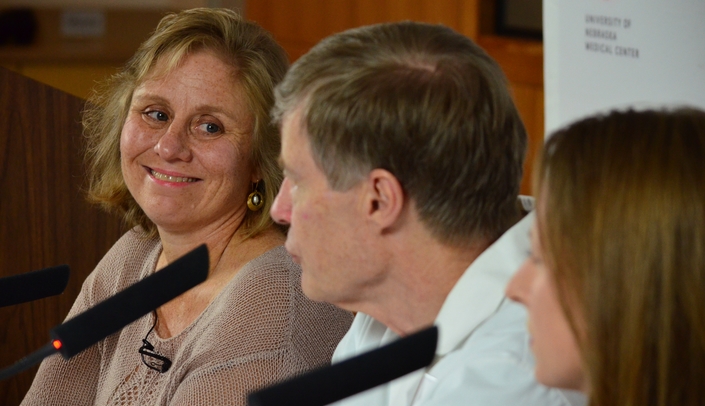The following excerpts are from Debbie Sacra, whose husband Rick is being treated for the Ebola virus at the medical center’s Biocontainment Unit. Debbie Sacra released the statements Thursday as she shared her husband’s story with local and national media, while asking everyone to keep their focus on the Ebola crisis in West Africa.
“He is steadily improving. We are so appreciative of the attention and professionalism of the Biocontainment Unit team here at the Nebraska Medical Center. We have all been cared for on every level by the physicians, nurses and administrators at this great institution. Nebraska should be proud.
View more photos from Thursday’s press conference.
“We are amazed at how quickly Rick’s condition seemed to turn around after he was admitted on Friday. As his friend Kent Brantly said on national TV, we attribute his recovery to both faith and science. Rick asked me to say that he is humbled and overwhelmed by the words of kindness and support that he has received since his diagnosis with Ebola virus disease.
|
“Rick went to Liberia at the beginning of August because he could see that the Ebola crisis was setting off a domino effect in the Liberian health care system-not only was there inadequate medical care for those with Ebola disease, but patients with common health problems were not getting treatment. Those with high blood pressure would not be filling their prescriptions, those with diabetes would not be able to have their blood tests and parents were going to lose their young children because they had contracted malaria and there would be no place to receive the lifesaving IV drugs they needed.
“When Rick arrived at the beginning of August, there was not one box of gloves to be purchased in the city of Monrovia so clinics and hospitals had almost no choice but to close their doors until they could get the supplies they needed.
“The fight against this crisis is going to take more time and resources. We in America enjoy many benefits from globalization, and we’d like to think that we can isolate ourselves from a situation like the one in Liberia – but every day and every week that we don’t do what we can to stop Ebola in West Africa, we are risking the possibility that it will not stay in West Africa.”
